- Home
- Mordecai Richler
St. Urbain's Horseman Page 3
St. Urbain's Horseman Read online
Page 3
His sojourn in Buckinghamshire cut short, Harry, like so many other East End kids, was returned to Stepney in time for the blitz, where his father, no Churchill-idolater but an avid Left Book Club subscriber, dragged him out to absorb all the anti-Semitic sights, from the walls scrawled with “It’s a Jewish War” to the poster that read
YOUR COURAGE
YOUR CHEERFULNESS
YOUR RESOLUTION
WILL BRING
US VICTORY
altered by the Mosleyites to read JEW VICTORY.
While Jake, in Montreal, learned Stuka recognition from chewing gum cards and thrilled to hear, on Carry On, Canada, that when Churchill returned to his post as First Lord of the Admiralty, out to the Fleet went the signal, “Winston is back,” Harry, in Stepney, looked up to see the sky aflame and plunged into the throng rattling the gates to Liverpool Street tube station, where he was to bunk down almost every night of the blitz.
As Jake joined his father and mother, his aunts, his uncles, to huddle around the radio and hear the great man say, “Let us therefore brace ourselves to our duties, and so bear ourselves that, if the British Empire and its Commonwealth last for a thousand years, men will still say, ‘this was our finest hour,’ ” Harry, a ferret in search of novelty, ventured from ‘mickey’s Shelter’ to fetid Tilbury, where around the darkening bend in the tunnel you either unzipped for a tart against the wall or squatted to defecate. Given unfavorable winds, the stench of urine and excrement was overpowering. Mosquitoes abounded, lice proliferated. But meanwhile – as Harry’s father explained to him – meanwhile, in the bacchanalian cellars of the Savoy and the Dorchester, the rich stuffed themselves with smoked salmon and vintage wines, they danced, and consumed debs in comfort.
“Never in the field of human conflict,” Jake was stirred to hear the great man crackle over the BBC, “was so much owed by so many to so few,” but Harry had other tales to tell. “Did you know that among the Brylcream Boys, the so-called few, class distinctions more than survived?”
“No, Hershel, I didn’t know. I count on you for enlightenment.”
“If a pilot officer and a pilot sergeant, both flying Spitfires, shone in combat, the former got the Flying Cross, but the latter only a Flying Medal.”
“Yes, yes. It’s the rich what takes the plunder, ’arry, and the poor that gets the blame.”
“A commissioned R.A.F. officer could travel free and first class, naturally, on the railroads, but a pilot sergeant had to go third class.”
If, before rationing, the rich only ventured into Stepney to load their Bentleys down with sugar, now they streamed into the East End to see the blitz sights, especially the Tilbury Arches. Jake, in Montreal, laughed at the Happy Gang, and in London Harry became an ITMA addict, but the one real giggle of the war, Harry said, was Red Army Day, the Lord Mayor praising Stalin in the Royal Albert Hall and Harry Pollitt enthusing over Churchill, the Sword of Stalingrad being on exhibit in Westminster Abbey.
“This island race, this happy breed, did not stand alone in 1940, or ever,” Harry liked to say. “We stood niggyback on the Empire, if you get my meaning?”
“Yes, Harry. I do.”
“Did you know that in 1939 a penny an hour was a normal industrial wage in India and that their per capita income was something like seven quid a year?”
“I never question your figures, Hershel.”
4
THE BABY’S PIERCING HUNGRY HOWL JOLTED NANCY awake, savagely, out of a sleep fathoms deep, her dream cut short.
“Jake, could you please rock the baby until I pee and –”
Not there. Nancy wavered only briefly, between bassinet and toilet – the baby’s needs, hers – before she scooped him to her aching swollen bosom lest his screaming wake Sammy.
And Molly.
And Mrs. Hersh.
The very morning of his mother’s arrival, Jake, his manner fiendishly sweet, had said, “I suppose we must reconcile ourselves to the fact that you’re on one of those twenty-one day return flights?”
“I’m going to stay here for just as long as I’m needed, ketzelle.”
Mrs. Hersh had flown over a week before the trial to be with them during, as she put it, “Jake’s ordeal,” and it fell to Nancy, as if she didn’t have sufficient troubles, to obviate an ugly collision between them by filling tense silences with prattle about the children and tedious comparisons between British and Canadian life, the sort of small talk which propelled Jake, liberated but unappreciative, out of the room. Jake’s behavior was atrocious, devious as well. He ricocheted between icy cruelty to his mother and what she, understandably, came to cherish as acts of filial kindness.
Nancy got used to him coming abruptly awake at three a.m.
“Didn’t my mother say,” he would ask, “that she was going shopping in the West End first thing in the morning?”
“Yes.”
Then he would scramble into his dressing gown and shoot outside to make sure that there were no bicycles, scooters, or other potentially treacherous obstacles in her path.
“Imagine,” Mrs. Hersh would say to Nancy, “this morning he insisted on helping me across the street to the bus stop. That’s some son I’ve got there.”
“He’s one in a million, Mrs. Hersh.”
And at night in bed, Jake, lighting one cigarillo off another, pouring himself yet another cognac, would say, “You let her go to bed without reminding her to take her medicine. Great, fine. That’s a big help. Women her age get strokes just like that. Boom. Heart trouble runs in the family too.”
“But she’s your mother. In spite of everything she’s –”
“You’ve got to watch her like a hawk. Like a hawk, you hear? All I need is for her to be with us for years …” Bedridden.
Then, only last night, his first question on coming home from the Old Bailey was, “How’s my mother?” But once her continued good health was established, he devoted the rest of the evening to tormenting her with Old Bailey lore.
“Things have improved, Maw. I mean these days you can actually plead not guilty.” And he regaled her, savoring each oy, rising gleefully to her heaviest sighs, about the Press Room that had once been set up beneath the Old Bailey for administering Peine Forte et Dure; and how prisoners had been spread-eagled upon the stone-flagged floor, their arms secured, and heavy weights laid upon their bodies until their ribs cracked or they pleaded to the charge on which they were being held. “Mind you,” he added, closing in, “even this was tempered with mercy. Prisoners were allowed a wooden spike under their backs to hasten penetration. With the conspicuous exception of one Major Strangeways who, in 1658, refused to admit to the murder of his brother-in-law and was so strong as to withstand the iron and stones that were piled on his chest. Fortunately, Strangeways was blessed with good companions, and a softhearted warder gave them permission to stand on him, hastening death. And there, Maw, you have the origin of the expression a friend in need. Like my pal Luke. Isn’t that right, Nancy?”
Mrs. Hersh, an early riser, usually lay in wait in her bedroom until she heard the children in the hall, a grizzly old hen perched on the edge of her bed, her flat brown eyes melancholy. So this morning, typically, when Nancy started downstairs with the baby in her arms at seven thirty, followed by Molly, followed by Sammy, Mrs. Hersh opened her door to join them. Mrs. Hersh was wearing pink flowery pajamas and slippers with baby-blue pompoms. The winged tips of her glasses were silver-speckled. “Good morning, my precious ones,” she said.
“Got a present for me?” Sammy asked.
“Devil! Such a devil!”
“Me too, it’s not fair,” Molly said.
“You hear, it’s not fair. Do you hear how I’m being threatened? Do you hear? Already yet. I could eat you. Both of you!”
Nancy discovered Jake asleep on the sitting room floor, moaning.
“Oh.” Mrs. Hersh’s big stricken brown eyes went from her son to the empty glass beside him on the floor. She brought a hand to her mou
th, appalled. “Oh, my. I’ll get the C-H-I-L-D-R-E-N out of the way immediately.”
“He’s asleep,” Nancy said evenly. “He’s asleep, that’s all,” and she shut the sitting room door softly behind her.
Jake surfaced to have his mother’s voice come clawing at him out of the kitchen. She must have Molly on her lap again, he thought.
“Sweetie-pie! My precious one! Beauty! Such a face. Have you ever seen such a face? Well, do you love your granny? Tell me.”
No answer.
“Say I love you. I-LOVE-YOU.”
“Ilubyou.”
“You hear? She loves me! She loves me, the beauty.”
“Would you care for some coffee, Mrs. Hersh?”
“Only if you’re making.”
“But I make coffee every morning, Mrs. Hersh.”
“And who said no?”
Molly began to whine.
“I suppose it’s uncomfortable for her, the dirty diaper. Maybe I should wake Jake.”
“Jake has never changed a nappy in his life. Let’s not wake him yet. And please, Mrs. Hersh, I’m not criticizing but –”
“Of course not, doll. Why should you?”
“– but when Jake comes in please don’t give him the long sad look. As if this was his last day on earth. Ignore him. Let him read his newspapers.”
“Certainly, doll,” Mrs. Hersh said, sighing.
Seated with them at the kitchen table, Jake read,
THE CRIPPLED BOY WHO
WANTS TO
BACK BRITAIN
A 19-year-old cripple wants to back Britain but, in spite of the fact that every Thursday he goes to the local labor exchange and asks for a job, they cannot find him one.
But for George the half-mile journey from his home in Eden Street, Kingston, Surrey, is a supreme effort, for he has a disease which makes every step difficult.
Apart from his physical handicap he is registered as a blind person. Recently he –
The doorbell rang.
“Jake!”
Does she have to disturb him? It’s such a pleasure to see him laugh.
Resentfully, Jake lowered his newspaper.
“I’ll get it,” Mrs. Hersh said, leaping up. “Let him read.”
“He’ll get it.”
Usually, Pilar would have answered the door. But she had picked this, of all times, to visit her family near Malaga, and so they would be without a housekeeper for another week.
It was the postman.
“Gorgeous day, isn’t it?”
“Yes.”
“I suppose you’re grateful for this sort of weather?”
This was the flip side of a record they sometimes played. Then Jake was supposed to say, At home, I’ve seen blizzards in September, and the postman would shake his fat foolish head, astonished but grateful to have been born in such a temperate and civilized climate.
Screw him. This morning Jake would say nothing. But the postman didn’t budge or hand over his mail.
“O.K., so you’ve seen the newspapers,” Jake said.
“No.”
“I don’t see how you could have missed it.”
There was, among other things, a familiar, yet all the same ominous-looking, brown envelope that had come OHMS. The tax inspector again.
“I’m sure the girl’s lying,” the postman said vehemently. Then he spoiled it by adding, “You’re just not the type,” but hopefully, quizzically.
“Neither was Christie,” Jake said, shutting the door.
Molly said, “I ate my lunch.”
“You mean breakfast, you nit,” Jake said, yanking her curly blond hair.
Molly was only four, but Sammy was seven, so it was necessary to conceal the newspapers from him. Jake retreated into the sitting room and had already begun to rip open the long brown envelope when the door began to inch open tentatively.
“Is it bad news?”
“I haven’t opened it yet, Maw.”
“You’re pleased I’ve come to stay with you. It’s a help, isn’t it?”
“Yes, Maw.”
“I’m glad. The children love me, they’re adorable.”
Jake squashed the unopened letter into his dressing gown pocket.
“I’ve been here a week and you haven’t once said how I look to you. Wouldn’t you say I carry my years well? Don’t you think I look young for my age?”
“Yes.”
“Everybody says so. Dr. Bercovitch, he adores me, when I went to see him about the lump on my breast, this one, he was amazed. Simply amazed. You’re sixty-two, he said. I don’t believe it. With such breasts. And he’s a doctor, you know. I get hot flushes, that’s all. Nature is full of amazing beauty, but it can be cruel too. Well, the lawyers will cost you plenty?”
Nancy called from the kitchen. “Darling, would you like some coffee?”
“Coming.”
Sipping coffee, pretending to be engrossed in the Guardian, Jake slid his foot along under the table until he touched Nancy. How he wished she would not nurse the baby at the kitchen table while his mother was there. Mrs. Hersh’s hot appraising eye on Nancy’s bosom enraged Jake. Suddenly Nancy let out a cry.
“Jake was a biter too, such a biter. I had tooth marks all around the nipples. He wouldn’t remember, would you, ketzelle?”
“Do you mind,” Jake asked, “if I take my coffee into the sitting room?”
But he could still hear her from there.
“Jake says I carry my years very well. He thinks I look young for my age. Of course,” Mrs. Hersh added, probing, “maybe he was just flattering?”
This once, Nancy failed to deliver reassurances.
“My jaw’s caved in a little, but listen, you can’t tell with me, my teeth they’re artificial. With others, they have them done up so white it’s pathetic. With me it isn’t vanity. Listen, I’m no fool. I don’t kid myself or go in for blue rinses. To grow old isn’t a pleasure.”
“But one must retain a certain dignity,” Nancy said in spite of herself.
“Yes, that’s the truth. But it isn’t like I was ever a raving beauty.” Shooting Nancy a hot bright look, she added, “For a beautiful woman, it’s worse, it must be utter hell to grow old.”
The baby howled briefly as Nancy moved him to another breast.
“You must take care, doll. The milk can stretch the skin something awful. You want to take care of yourself.”
Oh Nancy, Jake thought, Nancy my darling, and he began to sob. Without control. Without dignity. But with sufficient presence of mind to slip out of the sitting room and into the toilet. A torn section of the Saturday edition of the Montreal Star was folded over the radiator, opened at a full page Eaton’s ad. Sports equipment and clothes.
Eaton’s, Jake remembered, on a Saturday morning. It was Duddy, Duddy Kravitz, who took him there, only this time instead of trying to lift stuff in the toy department, they went directly to lingerie and when nobody was looking darted into the hall with changing rooms. Duddy pushed open the door just in time to gawk at a gorgeous girl stooping to snuggle into a black lace brassiere. A fat saleslady let out a shriek.
“I was only looking for my Aunt Ettie,” Duddy whined, retreating.
The saleslady snatched Duddy by the arm. “I’m going to get the manager and have you sent to reform school for life. Filthy things.”
“Aunt Ettie,” Duddy hollered.
“Oh, let him go,” the girl said.
Duddy stepped on the saleslady’s foot and they were off, scooting between shoppers, and flying down the escalator. Outside, Duddy said, “Did you see her bazooms, butt? What a handful!”
“A lot of good it did you.”
“Shmeck! Let him go, that’s what she said, but did you see where she was looking? Right at my bone. One more minute and I would have had her up against the wall.”
They found some butts, lit up, and climbed Mount Royal in search of couples in the bushes. “Everybody’s doin’ it, doin’ it,” Duddy sang, “pickin’ their nose
and chewin’ it, chewin’ it.” He told Jake that once he discovered a couple stuck together, just like dogs, and had to summon the St. John’s Ambulance man to get a kettle of boiling water to break them apart. Jake didn’t believe him. But there, your lordship, you have a scene from my early sex life. How Hersh was first led astray, he thought, feeling better, much better.
Jake reached into his dressing gown pocket for a cigarillo, but came up with the most urgent of the morning mail instead. The letter from the tax inspector. The Grand Inquisitor, bless him, was keen to meet with Jake and his accountant for further epiphanies.
If only he had listened to Luke.
“I happen to know of at least three of Hoffman’s clients who are being reassessed. If I were you, Jake, I’d move elsewhere.”
“I’m scared to. He knows too much about me.”
It was the sapient Oscar Hoffman who had first incorporated him, with a capital of one hundred pounds and three directors. Jake had come to him with a tangled and confused carton of accounts, receipts, and statements from his agent, which a bony little man, a bantam with steel-rimmed glasses, had gathered together, his smile servile, retreating from Hoffman’s office as unobtrusively as he had entered. Then Hoffman had told Jake that from this day forward he would draw a salary of five thousand pounds from his company, P.A.Y.E being deducted at source. A further ten thousand pounds could be left in company accounts, for outgoings, as it were, and there would be no need for more inventive measures to be taken until such time as Jake’s earnings burgeoned, as they certainly would, Hoffman assured him, beaming.
But at the end of the first year in the troubled life of Jacob Hersh Productions, Hoffman pondered the balance sheets and was displeased. “My goodness! Five thousand pounds in withdrawals!”
“Yes. I’m afraid so.”
“Surely, you invested some of this in screen properties.” Here he paused to peer at Jake. “Paying cash, you understand.”

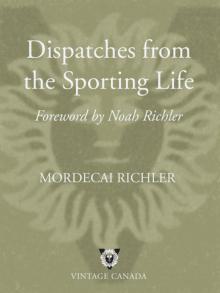 Dispatches From the Sporting Life
Dispatches From the Sporting Life The Acrobats
The Acrobats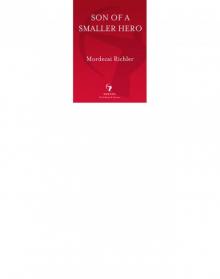 Son of a Smaller Hero
Son of a Smaller Hero Jacob Two-Two-'S First Spy Case
Jacob Two-Two-'S First Spy Case Jacob Two-Two Meets the Hooded Fang
Jacob Two-Two Meets the Hooded Fang Jacob Two-Two and the Dinosaur
Jacob Two-Two and the Dinosaur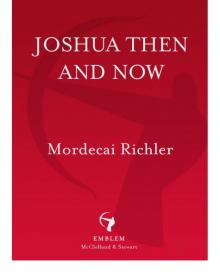 Joshua Then and Now
Joshua Then and Now Solomon Gursky Was Here
Solomon Gursky Was Here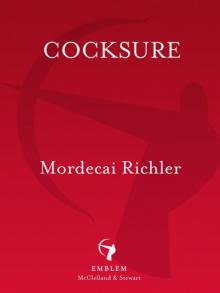 Cocksure
Cocksure The Street
The Street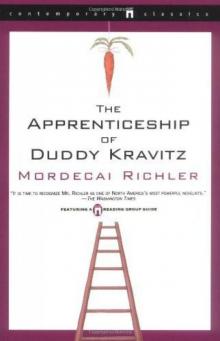 The Apprenticeship of Duddy Kravitz
The Apprenticeship of Duddy Kravitz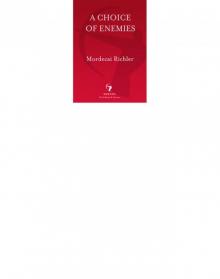 A Choice of Enemies
A Choice of Enemies Barney's Version (Movie Tie-In Edition)
Barney's Version (Movie Tie-In Edition)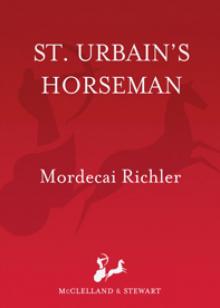 St. Urbain's Horseman
St. Urbain's Horseman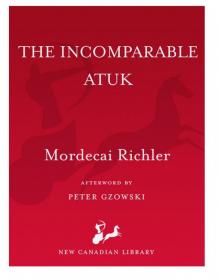 The Incomparable Atuk
The Incomparable Atuk Barney's Version
Barney's Version